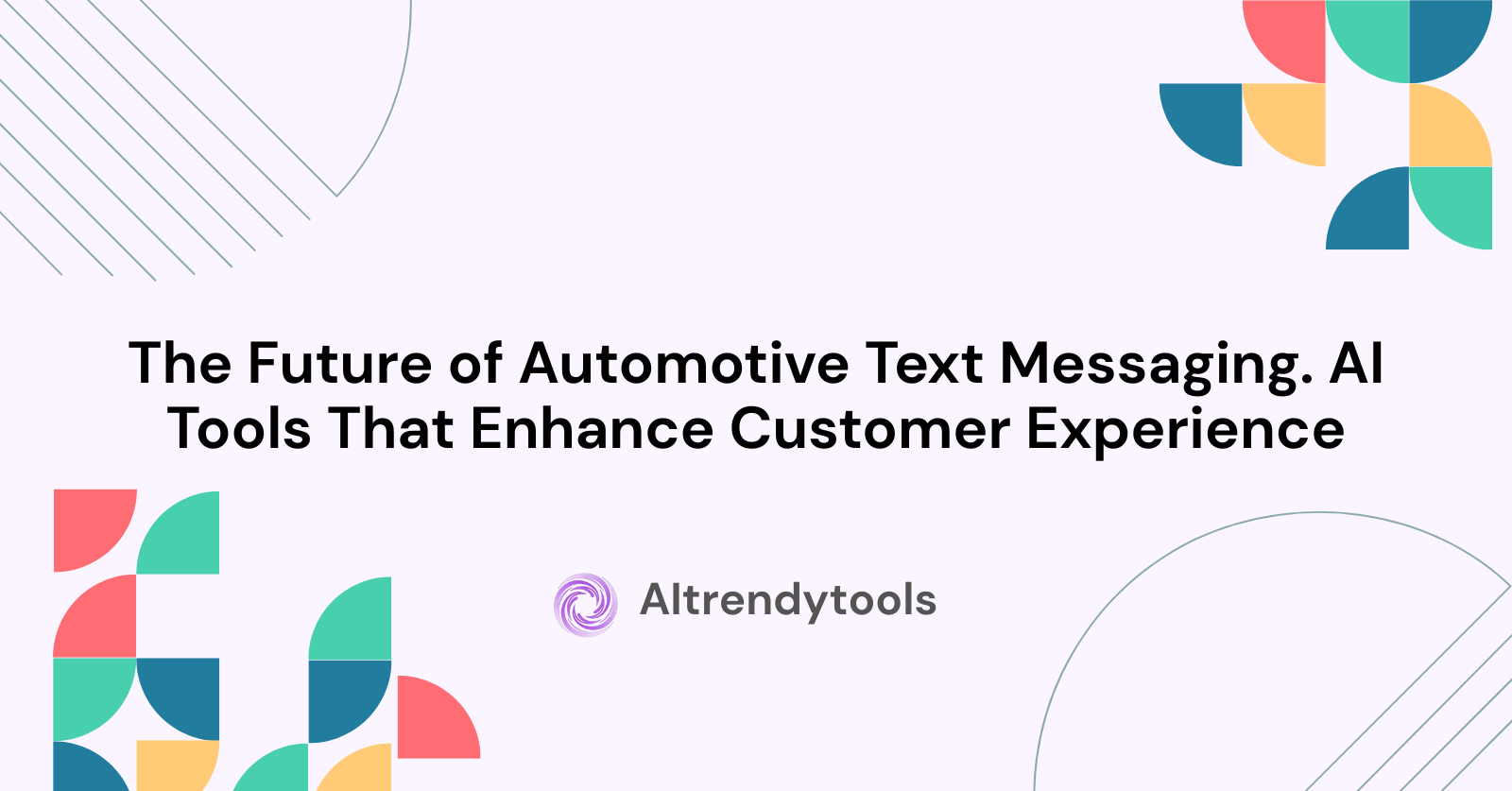🔥 AITrendytools: The Fastest-Growing AI Platform |
Write for usThe Future of Automotive Text Messaging. AI Tools That Enhance Customer Experience
Discover how AI is transforming automotive text messaging with chatbots, NLP, and automation to boost sales, loyalty, and customer experience.
Aug 29, 2025
We live in a world where mobile technologies continue to develop rapidly. That’s why consumers increasingly value speed, personalization, and convenience. So, it's no surprise that SMS, chatbots, and push notifications have become one of the key channels of communication. The one between car dealers, manufacturers, and customers. This is especially true in the automotive industry. Here, high customer expectations go hand in hand with the need for rapid responses. Text messages provide instant communication. This includes everything from confirming appointments to personalized offers and maintenance reminders.
Today, in the age of AI, new tools are entering the market. These tools don't just send messages; they do so in the most relevant and timely manner possible. And therefore, effectively. They analyze customer data and predict their needs. They can even organize multi-channel communication automatically. This means not only saving time and resources for the business, but also significantly improving the customer experience. The customer feels directly heard and served.
Below, we will take an in-depth look at the future of text communication in the automotive sector and examine modern AI tools. Specifically, those that are transforming this sector. We will also outline the key trends that are already changing the rules of the game. So, how does the use of such technologies affect sales, loyalty, and customer satisfaction?
The Automotive Sector and the Evolution of Text Messaging
- From simple SMS to intelligent chatbots
- Customer-oriented automation
From simple SMS to intelligent chatbots
For a long time, text messaging in the automotive industry was limited to the following simple functions.
- Test drive appointment confirmation messages;
- Service reminders;
- Short promotions.
These were one-way messages with minimal personalization.
But now, AI-powered automated chatbots allow you to switch to interactive dialogue. They can answer typical questions. They can provide information about:
- Available models;
- Service schedule;
- Financing options, etc.
Thanks to natural language processing, the customer has the impression of live communication. At the same time, the business receives data about the customer's needs.
This change in approach allows you to:
- Reduce the workload on operators;
- Speed up responses;
- Improve the sales and after-sales service process.
Customers who receive informative, clear answers to their questions are more likely to feel important. Their trust in the brand grows.
Customer-oriented automation
Modern AI tools for text communications are capable of identifying customer behavior patterns.
A customer may regularly sign up for maintenance or test drives once every six months. In this case, the system can analyze this information. After that, it can automatically send a timely reminder. It can also provide relevant special offers or services.
AI algorithms can segment the audience by preferences. For example, owners of electric cars, budget or luxury models. And then send relevant messages to each segment. In particular,
- Electric car owners — information about the status of charging stations and software updates;
- Luxury customers — about premium options and VIP service;
- Budget customers — advantageous maintenance packages or promotions.
Understanding all this, the following becomes obvious. Namely, how important it is to choose the right solution for the effective implementation of such systems. In this context, it is equally important to know about the platforms that provide such capabilities. One of them is a comprehensive solution where businesses can get flexible tools for processing text messages in the automotive sector. That is why it is worth paying attention to automotive text messaging, which allows you to conveniently integrate SMS, chatbots, and other channels into a single system. This can improve the efficiency of customer communication and increase response speed. It also allows you to personalize messages according to individual customer characteristics. This approach organically continues the theme of automated interaction. It also encourages you to learn more about the platform's capabilities.
Once you understand the specific solutions and their advantages, it is worth delving deeper into the key AI technologies that underpin the transformation.
Key AI Technologies Transforming Automotive Messaging
- Natural language processing
- Campaign analytics and optimization
- Machine learning for predicting customer needs
Natural language
It is the ability of systems to understand, analyze, and generate human language. This is the core of modern text communications. It allows chatbots to respond not only to ready-made commands but also to variable customer requests. In particular:
What are the current promotions on cars?
When should I come in for maintenance?
Do you have any new electric cars?
A chatbot with an NLP module recognizes the intentions and entities in a message, forms the context, and responds as relevantly as possible. This provides instant feedback. Accordingly, it significantly improves interaction.
Campaign analytics and optimization
AI tools analyze campaign effectiveness. Specifically, how often customers read SMS messages or follow links. Or how often they respond to test drives or service appointments. This allows you to:
- Determine the best time of day to send messages;
- Determine the optimal frequency of sending. That is, you will not be annoying, but will remain in focus;
- Track which types of messages give the best feedback. That is, reminders, offers, or informational messages.
Based on this data, the system can automatically adjust strategic decisions. In particular, it can reduce the number of messages for customers who have already signed a contract. Or, it can add an additional notification to those who did not respond to the first one.
Machine learning to predict customer needs
AI systems can analyze customer purchase history and behavior to predict when and what they might need. If a customer ordered winter tires in a specific month, the system will offer to place an order in advance before the season. And if they requested filter and oil replacement after a certain period, the system would generate a reminder.
Moreover, machine learning can help identify trends among customers:
- Who is actively looking to trade in their car,
- Who is willing to use financing services,
- Who responds to test drives, etc.
Based on this, you can offer exactly the services that best meet the customer's needs.
Advantages of Implementing AI Tools in Text Communication
- Resource savings and increased efficiency
- Improved customer experience and satisfaction
- Increased sales and repeat visits
Resource savings. Increased efficiency
By replacing some human labor with automated systems, companies can save significantly. Specifically, they can reduce the workload on operators and decrease the time it takes to process requests. They can also speed up response times. This allows resources to be focused on complex and critical requests that require human intervention.
Improved customer experience and satisfaction
Customers expect fast and personalized interactions. From this perspective, AI chatbots respond instantly. Messages are automatically tailored to the individual. In particular, they consider previous inquiries, car type, or the date of the last service or purchase.
This approach creates the impression that the customer is remembered and valued.
Increasing sales and repeat visits
Reminders, relevant service offers, or personalized offers all encourage repeat purchases.
When a customer receives a message about the expiration of a warranty or a recommendation to upgrade components, it is an opportunity for the service to offer a profitable maintenance package. At the same time, segmented promotional offers for new models or accessories can encourage additional spending.
Challenges. Ethical Aspects
- Privacy and data protection
- Balance between automation and humanity
- Integration with existing systems
Privacy. Data protection
AI solutions process significant amounts of personal data. Therefore, it is important to ensure that all information is stored and processed in accordance with the law and security standards.
Balance between automation and humanity
Despite the effectiveness of AI, an excess or untimely messages can annoy the customer. Frequent or unwanted notifications will cause irritation. Therefore, it is important to set the frequency and content correctly. Namely, send important updates, but do not overload with spam.
Integration with existing systems
Many companies use ERP, CRM, DMS, etc. AI tools must integrate seamlessly. This is to ensure that information is up to date and messages are sent effectively at the right time. This may require technical effort, from API configuration to staff training.
Hypothetical Case Studies Based on Trends
1. Car Brand Service Center
Let's assume that a customer signed up for maintenance last year in a certain month. The AI system automatically analyzes the history of requests and determines that in about a year, the customer will need another maintenance service. The system sends an SMS reminder two weeks before the possible date of the scheduled check-up. Along with this, it sends a personalized offer. The customer clicks on the link, selects a date, and the system automatically confirms via SMS or chatbot. All steps are carefully monitored.
As a result, we see an increase in the number of repeat service requests and customer retention.
2. Online sales of electric cars
The company sells electric cars and actively uses chatbots for preliminary consultations. The AI system analyzes that a customer who was interested in a model has returned after a certain period of time. The chatbot automatically sends a message stating that the model is available. It also asks the question: Would you like to learn about a test drive? It also adds an option to schedule an appointment.
As a result, we have more test drives and a higher chance of successful sales.
Conclusion
The future of text communications in the automotive industry is definitely the deep integration of AI tools. They transform simple mass SMS messaging into a multi-channel and interactive experience. Thanks to NLP chatbots, machine learning, and analytics, companies can:
- Predict customer needs,
- Automatically send the right messages at the best time,
- Optimize marketing,
- Improve the customer experience.
The key will be balance. That is, automation should serve people, not replace them entirely. Proper settings, integrations, and ethical standards are necessary. Customers increasingly value speed and professionalism. So, platforms that provide opportunities for automotive text messaging will remain in the spotlight. This is because they will help businesses stay closer to their customers. Moreover, to build trusting, long-lasting relationships.
Text communications become more complex and customers more demanding. That is why it is the combination of AI technologies and a human approach that will help the automotive industry surprise its customers. And in the coming years, text messaging may become not just a channel, but a medium for personalized live dialogue between the brand and the customer.
🚀 Submit Your Tool to Our Comprehensive AI Tools Directory
Get your AI tool featured on our complete directory at AITrendytools and reach thousands of potential users. Select the plan that best fits your needs.





Join 30,000+ Co-Founders
Related Blogs
MovieSwap: The Bold Idea to Free Every Movie Ever Made
MovieSwap wanted to let you stream any movie ever made legally. Discover why this bold Kickstarter idea failed and what it means for film fans today.
RapiCredit Review 2026: Fast Loans in Colombia?
Get cash fast with RapiCredit Colombia's top fintech lender. See real rates, requirements & honest reviews before you apply. Is it right for you in 2026?
Dramacool: Watch Asian Dramas Free with English Subs
Watch Kdramas, Cdramas & Asian movies free on Dramacool. English subs, no sign-up, daily updates. Full 2025 guide: app, alternatives & fixes.
Submit Your Tool to Our Comprehensive AI Tools Directory
List your AI tool on AItrendytools and reach a growing audience of AI users and founders. Boost visibility and showcase your innovation in a curated directory of 30,000+ AI apps.





Join 30,000+ Co-Founders

